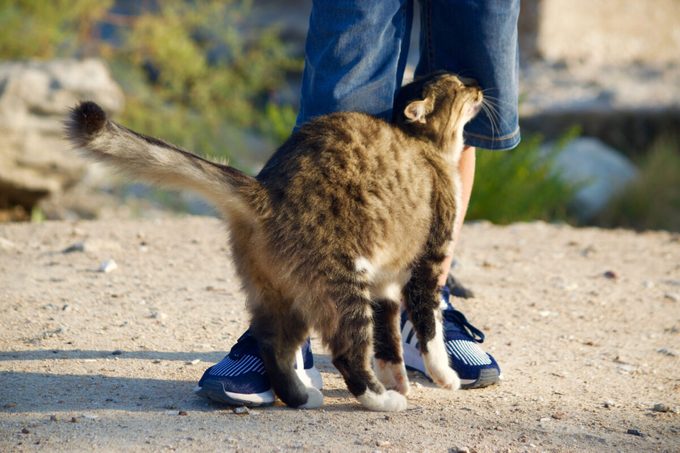Is it pure love, a rightful claim or something else entirely? A cat behaviorist breaks down the real reason why cats rub against you.

Why Do Cats Rub Against You? A Cat Behavior Expert Explains

Cats have a reputation for being mysterious. And let’s be honest, they’ve earned it. One moment, they’re giving you a suspicious side-eye, and the next, they’re wagging their tail like they’re excited (dare we say pleased?) to see you. Which brings us to the leg rubs that seem part hug, part ambush. Are they showing love … or telling you to move out of the way? Sure, we can take a guess, but most cat owners want the details: Exactly why do cats rub against you?
To get to the bottom of it, we checked in with Mikel Maria Delgado, PhD, a certified cat behavior consultant and animal behaviorist. Ahead, she helps us crack the code behind this common (and surprisingly meaningful) kitty habit. Whether you’re a lifelong cat parent or new to the world of whiskers and purrs, it pays to understand what’s going on in that mysterious little feline brain.
Get Reader’s Digest’s Read Up newsletter for more pets, tech, travel, cleaning, humor and fun facts all week long.
Why do cats rub against you?
It has to do with scent, says Delgado. “Cats have scent glands all over their bodies,” she says. Thanks to those scent glands, cats transfer their scent when they rub against people or objects.
Rubbing against someone or something serves two purposes.
- Territory marking: When cats rub against you, they’re marking you as their territory. In essence, your cat is “claiming you.” The same applies to objects like your couch.
- Bonding: It is a sign of inclusiveness and affection. “It allows them to share their scent with other cats they are friendly with, creating a group scent,” says Delgado. By rubbing against your legs, “your cat is letting you know you are part of their inner circle,” she says.
But there’s another reason cats rub against your legs, and it’s a learned behavior, rather than an instinctual one. “Many cats learn they can get your attention by rubbing on you, so it’s not unusual for cats to do this when they want something, like dinner.”
If cats rub against your legs, does it mean they like you?

When cats rub against your legs, they’re letting other cats know that you’re their human. So yes, it’s a safe bet that they like you.
But there are many ways for cats to show their owners love, not just by rubbing against them. “Some felines like simply to be in the same room with you or enjoy interactive play and training with you,” Delgado explains. “Other cats are more affectionate and may sit on a lap or seek out attention.”
Should I worry if my cat is rubbing against things all the time?
If your cat seems a little too into headbutting, Delgado says there’s no cause for concern. This is a normal part of a cat’s body language. “It’s one way they mark their territory, and rubbing can help cats feel safe,” she says.
But why do cats rub against the same thing, like the side of the sofa, all the time? Well, that’s normal too. “Cats will often return to the same areas to ‘refresh’ their rubs.” As their scent wears off over time, they’ll need to reclaim the person or object all over again.
So the next time your cat gives you a surprise leg brush, you’ll know it’s more than just passive affection. And now that you know why cats rub against you, you can return the love—in their language.
About the expert
|
Why trust us
At Reader’s Digest, we’re committed to producing high-quality content by writers with expertise and experience in their field in consultation with relevant, qualified experts. We rely on reputable primary sources, including government and professional organizations and academic institutions as well as our writers’ personal experiences where appropriate. We verify all facts and data, back them with credible sourcing and revisit them over time to ensure they remain accurate and up to date. Read more about our team, our contributors and our editorial policies.
Source:
- Mikel Maria Delgado, PhD, certified animal behaviorist and certified cat behavior consultant who works with Rover























